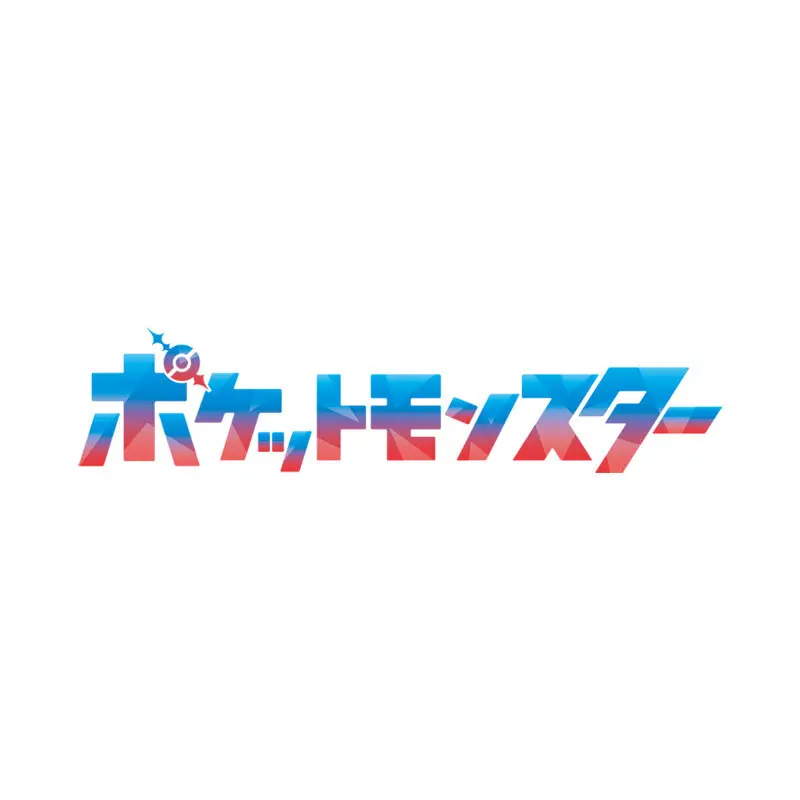VisionTOMY Group’s Human Resources Strategy
Build an environment facilitating a passion for work that creates Asobi
as an organization capable of self-driven and sustainable growth.
The human resources at domestic and overseas Group companies who are involved in the creation of Asobi are important human capital for our company. Based on our Purpose and Vision, we will continue to improve the well-being of our employees and further strengthen our organizational culture to achieve sustainable growth as a company.
Human resources will fulfill the functions of both the business and corporate divisions and work to solve issues across functions without being too constrained by existing roles.
We will strengthen our human resources who promote marketing on a global scale, as they are particularly important to the success or failure of our business strategy.
We will provide opportunities for the next generation of management candidates to gain experience from a mid- to long-term perspective. We will also welcome external human resources and provide them with an environment in which they can thrive.

Our Policy and Strategy
Developing Human Resources to Realize Purpose, Vision, Values, and Promise
The vision of the TOMY Group’s human resources strategy is to “build an environment facilitating a passion for work that creates Asobi as an organization capable of self-driven and sustainable growth.” Under this Talent Strategy Vision, the Group strives to support employee skill development by enabling individual employees to think about their careers, with the aim of maximizing their skills and abilities while opening up new possibilities. We are also working to reform our career planning, evaluation, and compensation systems so that diverse human resources can work with a sense of fulfillment, maximize their personal growth, and help realize our Purpose, Vision, Values, and Promise. Going forward, we will make particular efforts to strengthen the development of next-generation management executives and human resources who promote marketing globally.

Results of Employee Survey on Understanding
of TOMY Group Philosophies
*Respondents rated their understanding on a scale of 1 to 10

- *From June 2024 employee survey
Measures to Promote the Philosophies
*Including those to be implemented- ●Company-wide briefing on philosophies
(Once a year in April; 2024 briefing was held in May) - ●Implementation of roundtable talk on promoting the philosophies and internal dissemination
(Values roundtable talk starting from 2024) - ●Purpose promotion workshop and internal dissemination
(Aiming for ONE TOMY with a bottom-up approach) - ●Values 360-degree evaluation
(Implemented in personnel evaluations for management positions) - ●Ongoing implementation of promotion surveys
Roundtable Talk on Promoting
the Philosophies Led
by the Representative Director,
President & COO



Governance Structure
Developing and Expanding an Education System that Enables Self-driven and Sustainable Growth
To promote human resource strategies, the management meeting (Managing Directors’ Meeting), chaired by the President and CEO, deliberates and makes decisions on matters including those related personnel, organizational restructuring, and the working environment. In addition, depending on the importance of the content and the degree of impact on the company and externally, resolutions and reports are made at Board of Directors meetings.
To promote employee growth, a Human Resources Development Division has been established within the Human Resources Division to promote human resources development and training, putting in place a system to strengthen various measures and initiatives to achieve the Business Vision and Sustainability Vision formulated in the “Medium- to Long-Term Management Strategy 2030.” The TOMY Group is working to develop and expand an educational system to help maximize individual employee capabilities and enable self-driven, sustainable growth. We will provide a wide variety of training content so that each employee can think about their own career, aim to improve their skills and capabilities, and unlock further potential, while also creating a system that allows employees to make self-driven choices according to their own career plans, thereby supporting the development of their capabilities.

Initiatives
The TOMY Group is promoting the following six major initiatives.
*DE&I: Diversity, equity & inclusionUnique TOMY job-based personnel system
We disclose rules regarding personnel evaluations and promotion requirements and conduct fair and impartial evaluations. We also conduct evaluator training for managers. We are revising our personnel system to one that promotes the growth and job satisfaction of all employees and maximizes their performance.
Three Characteristics of the Unique TOMY Job-Based Personnel System

(1) Grading System
Introducing a multi-path job group system consisting of managerial and specialist positions to create careers from a wide variety of options
We have reformed the previously predominant form of career advancement, which was to pursue managerial positions. We have revised the definition of the role of specialist positions to promote career advancement achieved by exercising high expertise. We have introduced a multi-path job group system consisting of managerial and specialist positions, and have renamed the job groups previously classified as permanent positions to core positions. Job groups have been sub-divided into development, production engineering, quality control, marketing, sales, logistics, corporate, and other positions.
We are implementing a unique TOMY job-based grading system in which employees can hone their expertise in their respective positions and advance their careers to specialist positions, or experience a variety of positions before aiming for managerial positions. We also reviewed the role definitions of grades within core positions, reducing the number of grades by one and enabling employees to aim for specialist or managerial positions earlier.
Job Classification and Groups/Grading Structure
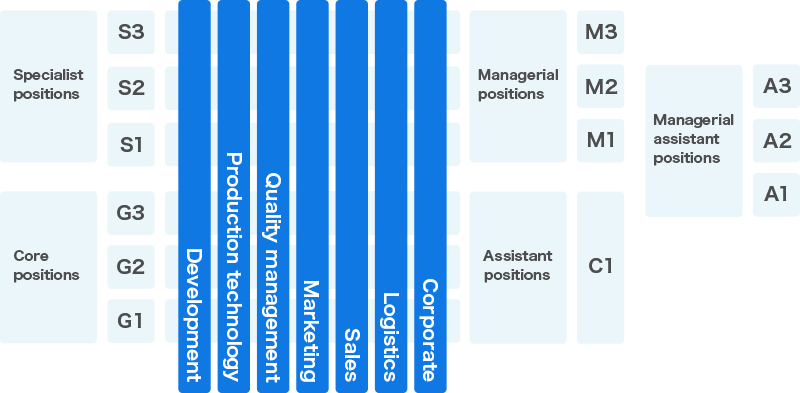
(2) Evaluation System
A system that clearly defines the different skills required for each position and the evaluation process
We have introduced an evaluation system that does not use the same criteria for all positions, but rather evaluates employees based on the degree to which they demonstrate the skills required for each position. We have prepared an environment that allows employees to grasp their current status in more detail and link this to their growth through meetings with their supervisors. In addition, we have changed from a relative evaluation system in which evaluations of superiority and inferiority are controlled by the rate of occurrence, with a normal evaluation as the center, to an absolute evaluation system in which the degree to which each individual has demonstrated various skills is compared to set criteria. We have also clarified where the results of evaluation and compensation are reflected. Work results and performance are evaluated as a performance evaluation and reflected as a variable coefficient in performance bonuses. At the same time, performance evaluation is not used for promotion, and if the employee's conduct and skills are evaluated as being of a level that contributes to a higher grade, the employee can be promoted by satisfying other requirements, such as an aptitude test.
*In addition to evaluation meetings, we conduct interviews with employees to learn about their medium-term career plans and promote their growth toward their envisioned careers. We are also developing mechanisms to understand employee aspirations regarding working overseas in order to develop global human resources.(3) Compensation System
Eliminating seniority-based wages and personalized allowances to make each grade more competitive
We used compensation amounts from an external survey as benchmarks to set upper and lower limit ranges for each grade. Upon being promoted, employees are moved within the range set for the promoted grade and their salary is adjusted according to their evaluation within the range, regardless of age or years of experience. Household allowances and child allowances, which were paid to employees who were heads of households and had dependent children, were paid primarily to men, and have now been eliminated. Instead, the wage structure will be more grade- and performance-oriented regardless of an individual's family structure or environment, to ensure that there are no wage differences or inequities due to personal factors.
Old Range
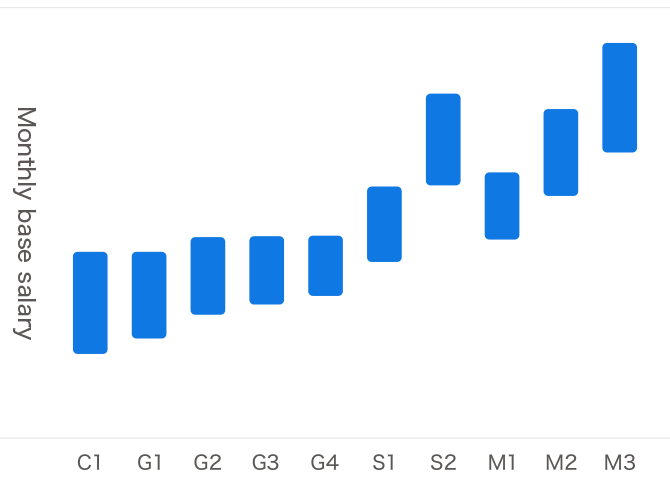
New Range
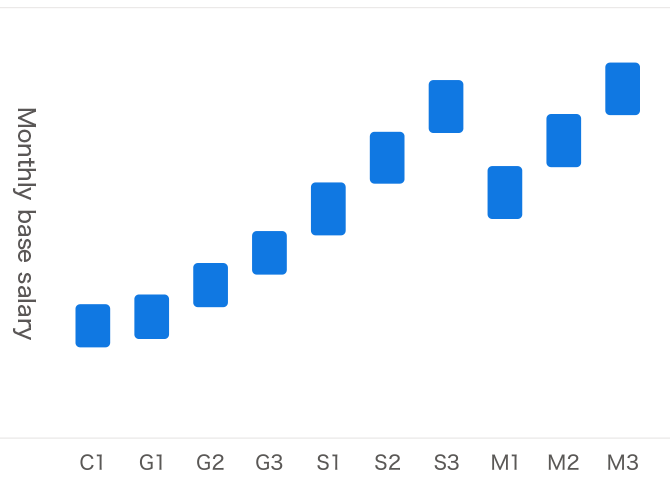
- Made clear distinctions between grades by differentiating the upper limit for G1 to G3
- Clarified the differences in roles by connecting M1 to M3
Education Initiatives
Under its Talent Strategy Vision, the TOMY Group strives to support employee skill development by providing various training programs enabling individual employees to think about their careers, with the aim of maximizing their skills and abilities while opening up new possibilities.
(1) Overview of Education System
Overview of Education System in FY2024 (Detailed)

|
Self-improvement and online training, 53 courses in total (covering all grades) |
|---|
|
|
Self-improvement and in-person training, 4 courses in total (covering all grades) |
|
In addition to the programs listed above, we conduct a Toy Technology Training Course for young employees involved in planning development, technology development, production technology, or quality management to learn about the structure of toys and technology involved in molding. We also provide a TOMY Toy Technology Think Tank brochure that summarizes our expertise on setting up a new production base. Through such efforts, the TOMY Group has established a framework that enables young employees to benefit from our long-amassed technology and expertise.
(2) Overseas Trainees Program
To foster self-directed career growth and develop globally skilled talent, we have introduced an overseas training program at our overseas operations. We will first target positions and locations related to development technologies, production control, and safety and quality, then gradually expand it to other positions and locations.
Objectives
- Foster diversity understanding and behavior through cross-cultural experiences
- Provide experience in global infrastructure development
- Build a network with overseas offices
- Help learn about local working environments, job descriptions, and roles
- Help identify issues on the Japanese side from a local perspective
- Assess future expatriate employees
System
- Short-term expatriation (up to one year) rather than long term
- Application by self-recommendation or recommendation by supervisor (with his/her consent); selection and decision by management
Promoting Diversity, Equity & Inclusion (DE&I)
The TOMY Group believes that embracing the diverse perspectives of a diverse range of people in our business is the best way to develop and invigorate our company, so we make our hiring decisions based on comprehensive judgement and a genuine respect for a candidate’s skills and individuality without reference to nationality, race, ethnicity, religion, gender, sexual orientation, age, ability or disability. In addition, TOMY International, which is responsible for overseas operations, recognizes the importance of DE&I and has established a committee to promote DE&I. This activity is a cross-border initiative, with the U.S. , the U.K., and Europe playing a central role.
Promoting the Advancement of Women
Creating a Working Environment Where Diverse Human Resources Can Thrive from a Gender Perspective
The TOMY Group has established an action plan to create an employment environment allowing women to play active roles in managerial positions. We have set targets to increase the percentage of women in managerial positions to at least 20% by the end of March 2026, and to increase the percentage of men taking parental leave to at least 30%. In addition, our medium-term sustainability tagets and KPIs (FY2024-2026) is to increase the percentage of women in managerial positions in the Group to at least 30% through a fair personnel system. In April 2024, we set up the DEI Promotion Group to strengthen various measures and initiatives to achieve these targets. As a key initiative, the department organizes roundtable discussions and workshops led by young female managers to help female employees find role models and set personal career goals. Other programs include next-generation female leader development training and training to improve mental toughness.
Percentage of Women in Managerial Positions
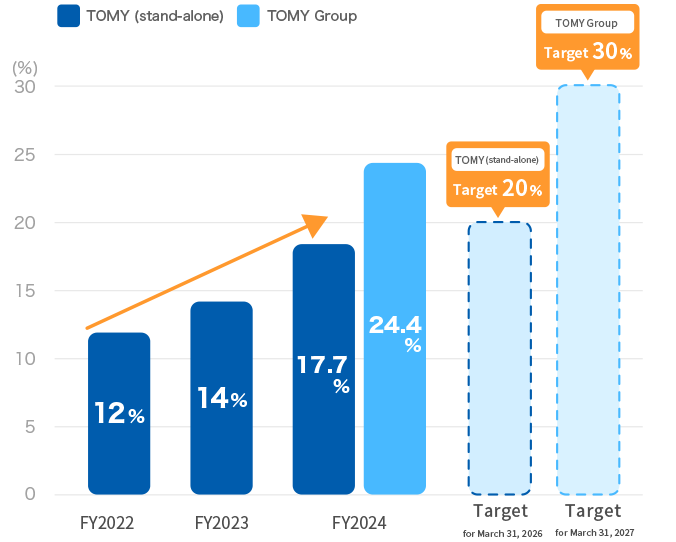 *TOMY Company (stand-alone)
*TOMY Company (stand-alone)
Percentage of Men Taking Parental Leave
 *TOMY Company (stand-alone)
*TOMY Company (stand-alone)
Rehiring Retirees and Specified Skill Personnel System
The TOMY Group has a retiree rehiring system for reemploying people who left the company at retirement age. Along with enabling them to leverage the skills, abilities and experiences they have gained over the years, the system is also used to train younger employees. We also have a personnel system under which employees with specific skills deemed vital to the Group (such as design, production, quality, after-sales service, overseas production management or business management) are designated as personnel with specified skills (called “fellows” within the company). We believe that bestowing the next generation with the technology, knowhow and experience gained through our wide-ranging operations around the world will be essential to the sustainable development of our business.
Mid-career Hiring Initiatives and Job Return System
We actively seek out mid-career hires whose skills are an immediate asset to the company. We also have a Job Return System in place to rehire former employees who left the company due to life circumstances — such as marriage, childbirth, childcare, nursing care or their partner’s job transfer — as well as those who left to further their career by going back to school, studying abroad or pursuing other roles. This system enables employees to utilize the knowledge and experiences gained after their departure from the company by returning to the TOMY Group, with the aim of revitalizing the company and creating new value.








